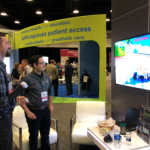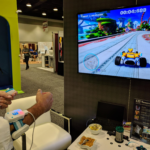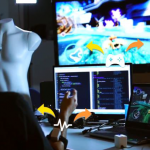Project Title:
Technologies to Train Myoelectric Prosthesis Users for Optimal Functional Outcomes
Summary:
Functional, effective training is key to a patient’s success using a myoelectric prosthesis. The critical time for developing good myoelectric control habits is in the pre-prosthetic phase (between wound healing and prosthesis delivery) but should continue after prosthesis delivery as well. Current myo-training devices rely on technologies that are expensive, manufacturer specific, and are typically non-motivating.
LTI is creating a portable, affordable, and interactive myoelectric training system that can be used in the clinic or home. The myoelectric gaming interface (MEGI) maps signals typically used for prosthesis controls to video games for training. The system leverages existing video game software with a focus on clinically relevant exercises. This device will likely increase the ease of myoelectric training and help lead to improved functional outcomes for the patient and cost savings for the healthcare provider.
LTI is investigating the long-term effects of myo-training on prosthesis control and outcomes. The aim of the project is to provide patients with a more engaging way to train for prosthesis use.
Publications:
- Myoelectric Logging Device for Upper Limb Prostheses
- Myoelectric Videogame Training Functional Outcomes
- Myoelectric Videogame Training Functional Outcomes Abstract
Funding:
This work is supported the US Army Medical Research and Materiel Command under Contract No. W81XWH-15-C-0022 and W81XWH-18-C-0084. The views, opinions and/or findings contained in this report are those of the author(s) and should not be construed as an official Department of Army position, policy or decision unless so designated by other documentation. In the conduct of research where humans are the subjects, the investigator(s) adhered to the policies regarding the protection of human subjects as prescribed by Code of Federal Regulations (CFR) Title 45, Volume 1, Part 46; Title 32, Chapter 1, Part 219; and Title 21, Chapter 1, Part 50 (Protection of Human Subjects).
Expected Completion Date:
September 2020











